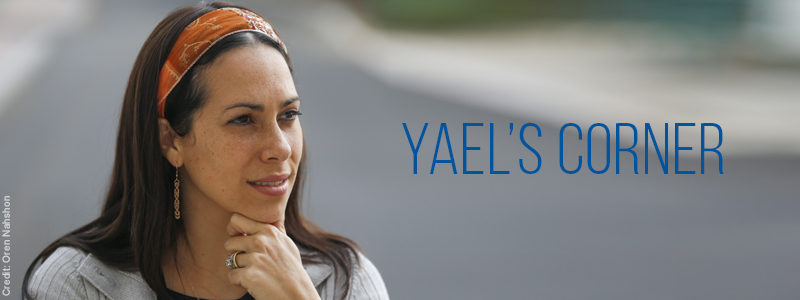
On the 'Island of Shabbat'
Shalom,
Just 20 minutes before Shabbat began, I walked up to an old friend’s house in Los Angeles feeling a little uncomfortable. With a scarf wrapped around my head and a huge suitcase, duffel bag and a stroller to drag back to Israel, I felt like I didn’t belong. I worried about being “too Israeli,” and that I wouldn’t comfortably blend into the crowd in metropolitan North America.
With slight hesitation, I knocked on the door and waited to see just how much of a fish-out-of-water I would feel for the next 26 hours, on the “Island of Shabbat” in LA.
There was no answer at the door, but I heard kids playing and singing inside. So like any good Israeli, I simply let myself in. Within a second of entering, all six kids stopped playing and stood frozen staring at me. “Who are you?” the six-year-old finally said. “I’m your Shabbat guest from Israel, and an old friend of your parents,” I responded. And with that, a new energy immediately filled the room. “You came from Israel?” the 3-year-old smiled, running up to give me a hug. Embraced in this sweet and innocent hug, my heart melted and I started to feel that maybe this Shabbat was going to turn out just fine.
It was then that my old friend Leah appeared, dressed in her beautiful Shabbat clothes. She too hugged me and thanked me for bringing “the energy of Eretz Yisrael” into her home.
I didn’t exactly understand what she meant, but it made me feel good nonetheless.
“Come and put your things down in Neshama’s room,” Leah sweetly said as she led me to a beautiful pink and frilly bedroom, obviously inhabited by a teenager. “Hearing that we have a guest from Israel was the motivation my daughter needed to clean her room for the first time in ages,” Leah joked. And indeed, the room was spotless. I sat down on the perfectly made bed, dressed with new sheets and blankets in honour of my arrival, and I was puzzled.
For months I have been bombarded with articles commenting on the struggles North American Jews are facing – their supposed disconnection from and skepticism of Israel. I have been reading heartbreaking op-eds written by Jewish parents who say their children are losing interest in learning about the Jewish faith. I have been studying the disturbing statistics documenting North American Jewry’s mass assimilation, and the huge amount of funds being invested into halting this trend. Yet my experience at Leah’s house told a different story, as did the meaningful interactions with nearly everyone I met.
More than 20 diverse people joined me at Leah’s Shabbat table, and I had a little giggle as I imagined how difficult it was going to be to find a topic of conversation that everyone would enjoy. Yet I was surprised as I watched the guests begin to interact: Jon, a 65-year-old single man from Oregon, was laughing and connecting with a 23-year-old hipster from LA; a 27-year-old divorced woman wearing high heels, a sequined dress and “I love Israel” sunglasses was deep in conversation with a 19-year-old Israeli originally from Hebron; and, all the while, Leah’s children sang and danced with a middle-aged hippie, sporting long hair and a kippa.
“What do these people have in common that allows them to get along so well?” I whispered to Leah, mid-meal.
“A deep love for Israel,” she answered. And I knew she was right as I listened for hours to the guests’ stories. They told me about their experiences in the Holy Land, their longing to return, and all about their love for the Jewish state.
From hipster to young, successful, from middle- aged divorcées to college students, I have realized that when you discuss Israel in the context of politics, it gets messy and divisive. Yet when you shift the focus to Israel’s unfathomably beautiful culture – the music, food, holidays, landscapes, spiritual connectedness and welcoming people – it unifies Jews from all walks of life.
When I came to North America, I was expecting to find myself in heated debates with critics of Israel and uncomfortable discussions on faith with hard-line critics, yet everywhere I have gone during my two-week visit – in both Jewish and Christian communities, I have been greeted with awe and admiration due to the simple fact that I live in Israel.
And this makes me feel amazing, not only because of the personal compliments, but because Israel has begun to reclaim the glory it deserves.
Yet the point to dwell on and strengthen is that for the vast majority of Jews, regardless of their religious affiliation, love for Israel is the key to our unity.
The Torah teaches us that there are 70 “faces to Torah,” meaning there are 70 unique paths to take and traditions to practice in order to reach God. The world loves to portray Israel as the issue that is tearing apart the Jewish world.
But, in reality, it is the one passion keeping us together.
With blessings from the Holy Land,
Yael
